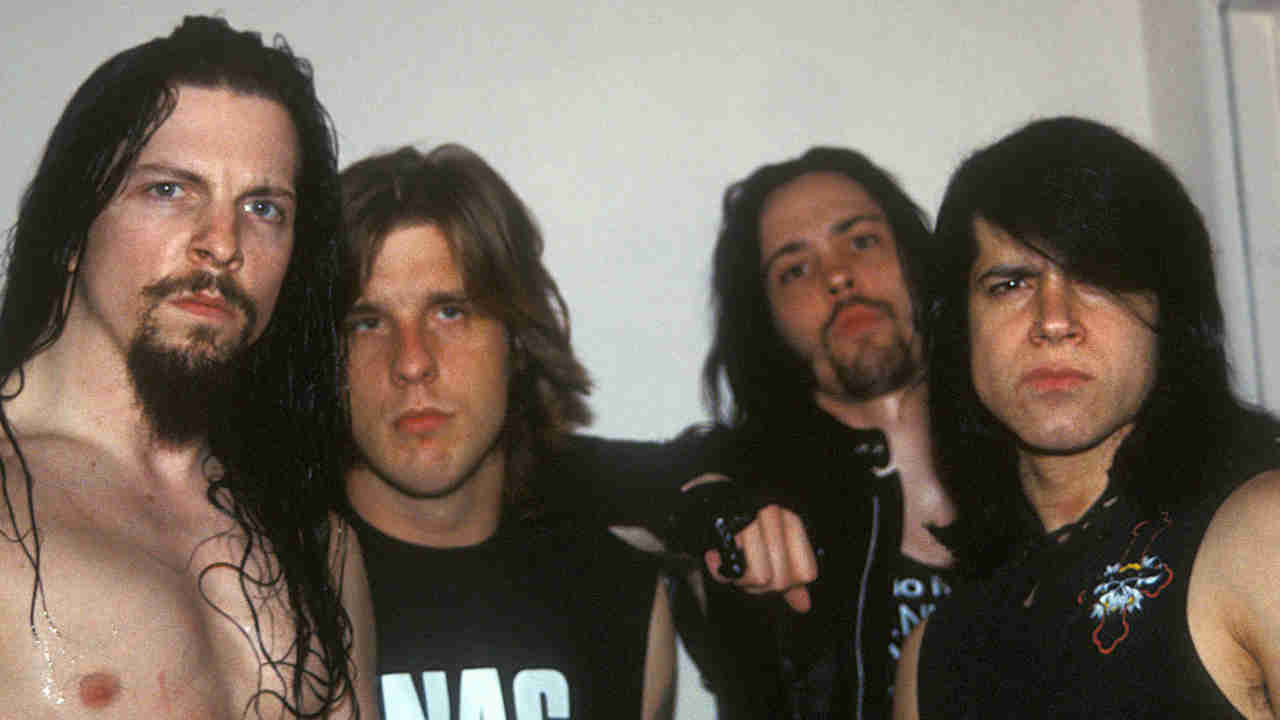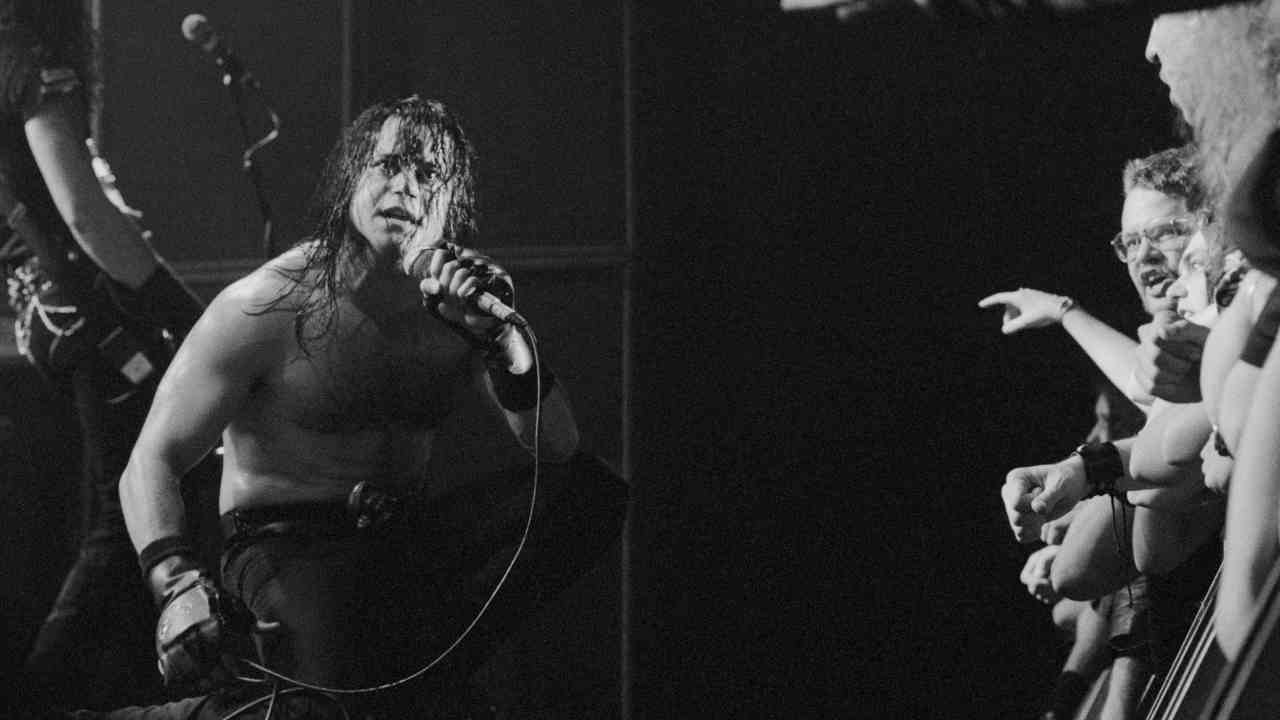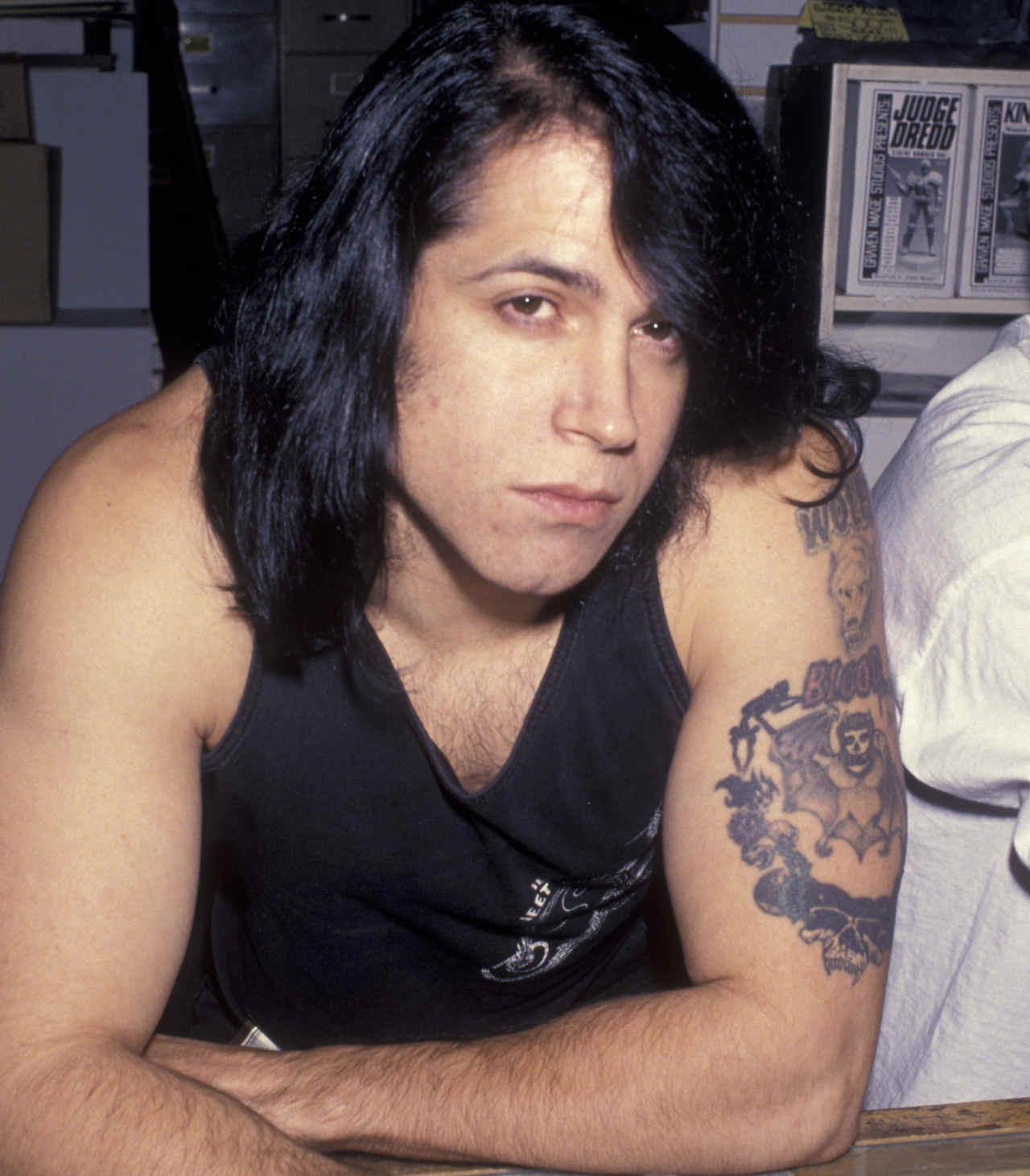
Former Misfits frontman Glenn Danzig’s long-running band Danzig made an instant impact with the bluesy goth-metal of their Rick Rubin-produced 1988 debut album. In 2007, the singer looked back on the making of a Metallica-approved classic.
Sometimes mocked, often revered, frequently emulated, Glenn Danzig has cast a large and peculiar-shaped shadow over modern metal. The singer formed legendary goth-punk band Misfits in 1977. That outfit’s lack of initial prowess and success was more than made up for by their eye-catching garb and ear-catching tunes. But constant instability within the ranks and Danzig’s own frustration with the limits of the band’s sound led to him splitting the band following a show on Halloween 1983.
His next move was to form a new band, Samhain, which saw him stripping away the Misfits’ schlockier, more B-movie elements in favour of something darker. But by 1986, they too were in turmoil, with Danzig becoming exasperated with his colleagues’ refusal/inability to keep pace with his protestant work ethic.
“I was starting to play all the guitars in the studio for a new Samhain record because [guitarist] Damien couldn’t play the track and then he just wouldn’t bother showing up,” says Danzig today, speaking from LA at a volume that doesn’t really necessitate the use of a phone. “I’d be like: ‘Where is Damien?’ And they’d say: ‘Oh he said for you just to play the track.’ I think at one point even his guitar tech tried out for the band while he was still a member. It’s not like I write hard guitar parts. So you should be able to play your fucking part.”
Danzig did what anyone would do and gave the other members of Samhain their marching orders. The only holdover was bassist Eerie Von (Eric Stellmann to his parents).
Around the same time, Danzig had met Rick Rubin, the hotshot founder of Def Jam Records and producer of Run DMC, Slayer and The Beastie Boys. He wanted to work with Danzig while the singer was still in Samhain, but the latter was less than impressed when the two first met.
“We’d done a big show and a lot of people from record companies were down trying to sign us,” he says. “After, this wild man comes backstage and he looks like he’s out of ZZ Top. It’s Rick Rubin. He is raving: ‘I want to produce you. You’ve got to let me, I produce Run DMC.’ I was like, ‘Who the fuck is this hippie hip-hop producer?’.
“But after hanging out in his office, it was just chaos with phones going everywhere and just mess. And talking to him for a bit I realised this was the guy who knew where we were going and had the commitment to see it through.”

Danzig had recruited guitarist (and longtime Misfits fan) John Christ for the latest line-up of his band. He had an intriguing choice when it came to drummers.
“It was either going to be Chuck Biscuits or… Phil ‘Philthy Animal’ Taylor from Motörhead. I’d been talking to Rick Rubin about overhauling the band and he just said ‘Who are your two favourite drummers?’ And when I told him he just said: ‘I know both of them.’”
It was Rubin who made the call, opting for Biscuits. With such a drastic change of personnel, it seemed like the right time to rechristen the band, and Samhain became Danzig. The singer says now that he always wanted to name his post-Misfits band after himself, but thought it was a bit too reminiscent of Billy Idol. Rubin thought it was a good idea.
“It just made sense. I started working with Rick and we just together decided it was time to change the name,” says Danzig. “Also I didn’t want to have to change the name again after that. I was already about to start my third band and I wanted that to be it.”
Work on Danzig’s first album had begun before the personnel and name change, with the singer demoing tracks while his former band were still a going concern.
“I was initially recording for a Samhain record really and if you listen on the Samhain box set [released in 2000], you can hear the Samhain versions of [Danzig tracks] Possession and Twist Of Cain,” he says. “It was more a case of retooling with Rick. I’d never really worked with a real producer before.”
Danzig had another, newer song that he instinctively knew was a classic in the making. The title of this brooding, powerful anthem was Mother.
“It was one of those songs that I just wrote in about half an hour and I brought it down and I showed it to Rick and I said: ‘This is probably one of the best songs I’ve ever written,’” he says, referring to the track that would, belatedly and in live form, give Danzig their biggest hit. “Like all of my best songs, it’s about anger. Really it’s about the PMRC thing. Musicians were on trial here in America and it’s one of the things that I really hate about [Vice President-turned-climate change campaigner] Al Gore. Right now people think he’s one of the greatest people on earth but this is the guy who started the PMRC and he wanted certain types of music outlawed.”
Danzig admits that he took the name change as an opportunity to change the sound a little bit but not too much. “It just became a little rawer with Danzig,” he says. “Possession was a Samhain song, Twist Of Cain was a Samhain song but working with Rick it became more… he didn’t like a lot of the atmospheric stuff that I like. He wanted to strip that stuff away. I think he did that with a lot of bands. He did it with Slayer, he did it with The Cult, he stripped it down and brought it back to its basic elements.”
Rubin’s production style had its critics, not least among some members of Danzig. “Over the years I took a lot of flak from the guys in the band who didn’t like him, they didn’t like his production, they didn’t like anything about him,” says Danzig, who adds that the only criticism that you can level at the sound Rubin got was that it’s “a bit dry”.
Danzig’s self-titled debut album was released on August 30, 1988. While it was initially ignored by radio and MTV, the band’s profile was boosted by longtime Misfits fans Metallica, who championed the band by wearing Danzig shirts and taking them out on their tour in support of …And Justice For All.
“We first met them in New York just before Master Of Puppets came out,” he says. “I remember when Samhain were out on tour they were on tour supporting Ozzy and if we were in the same city we’d hook up. Actually when they came to hang out with us in San Francisco, Cliff [Burton] and James [Hetfield] got arrested for fighting with a cop!”
Still, Danzig is a little cagey in admitting the impact Metallica’s cheerleading had on his career, whether it was with the Misfits, Samhain or Danzig themselves. “I don’t really know how to gauge how big a positive or negative influence they had on us,” he says. “I know that Cliff used to wear our shirts all the time and that probably raised our standing somewhat, but the Misfits were already quite big and we became even bigger after we broke up. I’m sure it helped though. It helped Samhain more than The Misfits but I still don’t think it did that much.”
Danzig’s pairing with Rubin also helped get them noticed to a larger degree than the singer’s previous bands. “We immediately went on a very long tour and played every single shit hole in America,” he says. “It’s good for getting you noticed.”
Yet even that work ethic together with Rubin’s patronage and the Metallica connection couldn’t quite push Danzig to superstar level. The fact that MTV refused to play the videos for the album’s singles Mother, Am I Demon, Twist Of Cain and She Rides didn’t help.
“Rubin used to get in touch with MTV and say, ‘I can’t believe you aren’t playing Danzig’ and he used to get the reply: ‘When we look at bands like Mötley Crüe and Ozzy, we know it’s a joke and it’s tongue in cheek. When we see Danzig we know it’s real.’ When they saw the Mother video, they said, ‘This isn’t a joke, this is serious.’
“Our reaction was if you have to be a joke to appear on MTV then fuck MTV. I’m not going to be some fucking clown for MTV. And then when we had a massive hit with the live version [from 1993’s Thrall-Demonsweatlive EP] five years later they had to play it then. They didn’t want to play us, they had to. We were top five on the radio across the country and MTV had competition from Music Box then, who were playing us 20 times a day. It was a great sense of vindication when they finally played us.”

Danzig was a classic slowburner. Thanks to the success of the 1993 live version of Mother, the original album was eventually certified gold in 1994 (it has since reached platinum status). Despite the success of their initial union, relations with Rick Rubin soured by the time of 1990’s follow-up, Danzig II: Lucifuge.
“Doing the first record was cool and on the second record it started getting strained because of the whole Hollywood thing he’d gotten caught up in,” he says.
By the time of 1992’s Danzig III: How The Gods Kill, the relationship with Rubin had fallen apart. Danzig himself produced the album, bringing back some of the atmospherics he loved.
The line-up that recorded those first three records, plus the Thrall-Demonsweatlive EP, didn’t last much longer. Following 1994’s Danzig 4, the singer effectively broke up the band and started afresh with former Prong frontman Tommy Victor on guitar, future Queens Of The Stone Age drummer Joey Castillo and bassist Josh Lazie (the line-up churn would continue over subsequent years). Danzig have continued to make albums, but that debut album remains their high water mark, even if it never elevated Danzig to the same level as his heroes Elvis and Jim Morrison.
“Well, I guess Misfits fans and Samhain fans really liked the record,” he says now. “It sold lots of copies.”
Originally published in Metal Hammer issue 173







